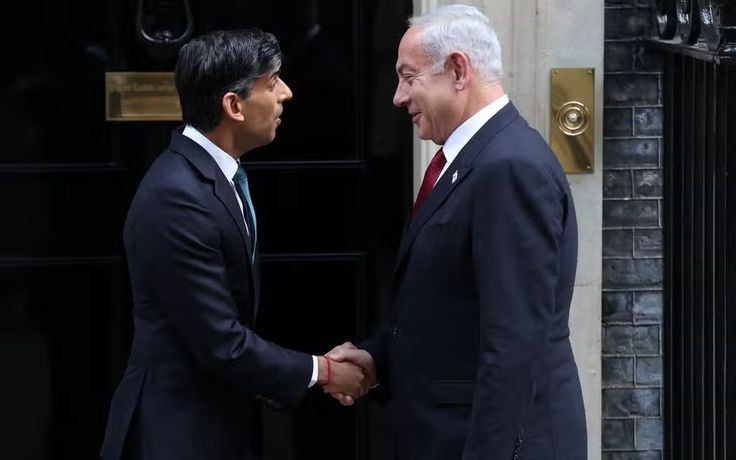Churchill, the Last True Statesman Still Matters
Winston Churchill was a figure of profound contradictions—an aristocrat who sometimes displayed troubling insensitivity toward the suffering caused by his own policies, yet simultaneously an unwavering defender of democracy and human dignity. His complexity mirrors the challenges of leadership itself, characterized by a relentless pursuit of moral clarity amid chaos. Today, as we witness political leaders driven more by image and polls than principle and legacy, Churchill’s example shines like a fading star in an increasingly dark political firmament.
Check out more of my articles on Activism and Palestine here.
Churchill’s Warnings Ignored
☕ Loving my work? Aw, thanks.
If something I wrote lit a spark or gave you something to think about, why not buy me a coffee? It’s a small gesture that helps keep this work honest, independent, and fiercely human.
Churchill – Flawed yet Principled
Churchill was far from a saint. His aristocratic upbringing and attitudes frequently blinded him to the suffering of the colonized, evident tragically during the Bengal famine, where his policies contributed to immense suffering and loss of life. Yet, within the same lifetime, Churchill became a beacon of moral courage in the face of tyranny. He stood resolutely against Nazism, sacrificing personal popularity and political expediency to warn Britain and the world about Hitler’s aggression. These choices, made at significant personal cost, underscore his deep conviction and unwavering dedication to democratic principles.
The Essence of a Statesman
A statesman and a politician are fundamentally different creatures. Politicians are primarily motivated by short-term gains—popularity, electoral success, and maintaining their positions. In contrast, statesmen envision a lasting legacy built upon moral responsibility, national well-being, and unwavering commitment to democratic ideals. Churchill exemplified statesmanship through his clear-eyed warnings against Nazi Germany, his relentless opposition to appeasement, and his courageous stand in defending democratic values, even at great personal and political risk.

Churchill’s Prophetic Warnings
In the early 1930s, as Hitler’s power grew unchecked, Churchill’s voice was largely ignored or derided. He meticulously warned against the dangers of Germany’s militarization and its aggressive intent. He highlighted the catastrophic consequences of appeasement during the Rhineland crisis, and again during the Anschluss of Austria. The Munich Agreement, which Churchill bitterly opposed, he predicted, would only encourage further aggression—and history proved him tragically right.
Drawing unsettling parallels to today’s global landscape, we witness similarly troubling dynamics. Countries like Israel and Ukraine, often supported by American geopolitical interests, are allowed to pursue authoritarian paths, with increasing nationalism, suppression of dissent, and even overt calls for violence against marginalized populations going unchecked or tacitly supported by Western leaders—echoing the disastrous appeasement Churchill warned against.
The Hollow Politics of Today
Modern politicians often bear little resemblance to Churchill’s courageous example. Their preoccupation with short-term electoral cycles, public image management, and opinion polling leads to a crippling lack of moral clarity and conviction. Nowhere is this more evident than in the blind appeasement of leaders like Netanyahu, whose open aggression against Palestinians—including incendiary statements and destructive policies—is met with quiet compliance or outright support from Western democracies.
Furthermore, the USA itself is increasingly exhibiting authoritarian tendencies, influencing global geopolitics through its satellite states like Israel and Ukraine, which amplifies and legitimizes their oppressive policies. This dangerous hypocrisy elevates short-term geopolitical interests above enduring democratic principles.

Churchill and the Modern Crisis of Appeasement
Churchill’s brave stance against appeasement starkly contrasts with today’s political complacency. Imagine Churchill confronting current global crises: it is unlikely he would remain silent or supportive of aggressive regimes simply for short-term political convenience. History repeatedly demonstrates the profound risks inherent in appeasing morally questionable leadership. These lessons echo urgently today as we observe Western complicity in authoritarian actions by their political allies, potentially setting the stage for greater instability and conflict.
Reviving Statesmanship
The urgent need for statesmanship has never been clearer. Our era desperately requires leaders who value moral integrity and legacy over short-term popularity and re-election concerns. Modern politicians must heed Churchill’s example, learning from his profound moral clarity even as they acknowledge his flaws. Achieving true statesmanship involves practical steps such as fostering accountability, courageously upholding democratic principles, and nurturing moral leadership within political institutions.
The Last True Statesman
Churchill remains one of the last true exemplars of statesmanship—a complex figure whose profound commitment to moral clarity amidst turbulent times still resonates powerfully. Today, as global politics teeters precariously towards complacency and complicity, Churchill’s warnings about appeasement are more relevant than ever. His legacy calls urgently for a revival of moral courage and principled leadership, reminding us that history demands vigilance against tyranny, not silent acquiescence.

☕ Loving my work? Aw, thanks.
If something I wrote lit a spark or gave you something to think about, why not buy me a coffee? It’s a small gesture that helps keep this work honest, independent, and fiercely human.
Thank You for Reading!
I hope you enjoyed this post and found it insightful. If you did, feel free to subscribe to receive updates about future posts via email, leave a comment below, or share it with your friends and followers. Your feedback and engagement mean a lot to me, and it helps keep this community growing.
If you’re interested in diving deeper into topics like this, don’t forget to check out the Donc Voila Quoi Podcast, where I discuss these ideas in more detail. You can also follow me on Pinterest @doncvoilaquoi and Instagram @jessielouisevernon, though my accounts have been shut down before (like my old @doncvoilaquoi on Instagram), so keep an eye out for updates.
Amazon has graciously invited me to take part in their Amazon Influencer Program. As such, I now have a storefront on Amazon. I warmly invite you to explore this carefully selected collection. Please be advised that some of my posts may include affiliate links. If you click on an affiliate link and subsequently make a purchase, I may receive a modest commission at no additional cost to you. Utilizing these affiliate links helps to support my ongoing commitment to providing thoughtful and genuine content.




Comments (0)